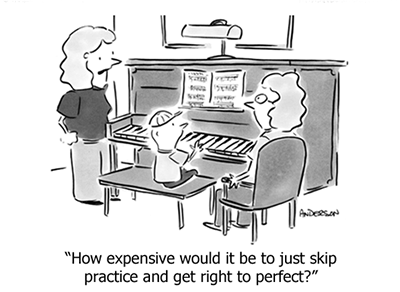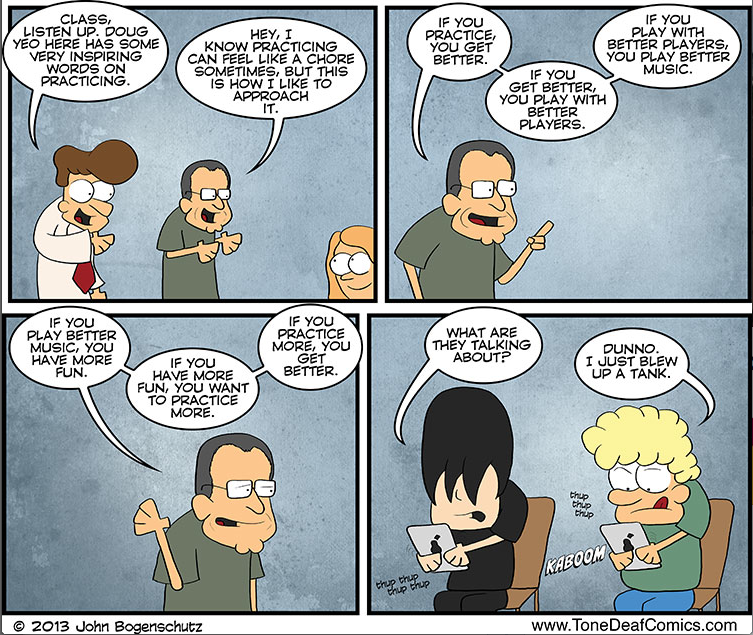It's Just Practice
Person: How do you perform so well?
Musician: Practice
Person: It must be an innate gift.
Musician: It’s practice.
Person: I can never understand how some people get all the talent. It’s a total mystery.
Musician: It’s just practice.

It doesn’t matter what you want to learn. The difference in performance or results are the direct result of practice. When you were learning to cook, was your first batch of cookies the best you ever made? Did you burn food on the campfire or BBQ pit at the beginning, when you were first learning how to manage the flame? Maybe. But I bet you have more successes today than failures. I guarantee … you’ve been practicing.
How about the first time you picked up a baseball bat. Did you strike out a time or two before you managed to knock the ball back into the field? What about learning to shoot a basket? Did the ball go through the first time? Can you do it today. You bet. But it took practice.
And it’s the same with learning the dulcimer. I’ll grant you that some seem to have more natural ability than others when it comes to learning to play an instrument. But we’re all on the same page when it comes to perfecting our craft. It just takes practice.
However, for some reason, some of us are resistant to forming the habit of regular practice. Oh, we have lots of excuses and probably the most common one is the lack of time. I’ll grant you … that can be a very real issue. But you’re not going to progress until you practice, get feedback, refine your approach and practice again. And again.
Here are some suggestions to help you overcome any obstacles to practicing your dulcimer.
- Acknowledge it will indeed be a challenge. Be honest about your time, whether you are really that short of time, or if you are just using it as an excuse. If it is true, you are sadly short of time to pick up your instrument or hammers, readjust your priorities and perhaps drop something else that is not as important to you.
- Limit the scope. Don’t try to learn everything at once. Pace yourself and break the techniques and tunes you want to learn into baby steps. Otherwise you may get discouraged before you’ve even started.

- Commit time. Block time on your calendar. Minimize distractions.
- Gather tools and materials. Have everything you need close at hand in one area – tuners, picks, tabs, or maybe backup tracks.
- Create practice partnerships. Get together with another dulcimer addict and practice together once a week.
- Consider coaching. Sometimes you need more support than the online videos you can find at Dulcimer Crossing. We have teachers standing by to assist for a few lessons or more. Your choice.

Making a commitment to practice is essential. It’s the only way to become proficient ... at anything. Starting today, discipline yourself to build practice into your schedule several days a week.
Categories
- News (8)
- Events (4)
- News (6)
- Events (4)
- subscriber news (233)
- mountain dulcimer (109)
- hammered dulcimer (112)
- uncategorized (6)
- lessons (189)
- mountain dulcimer (198)
- hammered dulcimer (154)
- history (22)
- music theory (40)
- octave (1)
- plagal cadence (1)
- dulci-bro (73)
- fingerpicking (3)
- fingerstyle mountain dulcimer (4)
- nina zanetti (4)
- aeolian (2)
- dorian (4)
- ionian (3)
- lydian (1)
- mixolydian (3)
- modes (2)
- traditional (2)
- tuning (4)
- music education (2)
- NSME (1)
- standards (1)
- drone (3)
- folk alliance (1)
- jonah brody (1)
- koto (1)
- chromatic mountain dulcimer (7)
- sam lee (1)
- scottish folk song (1)
- linda ratcliff (5)
- practice (26)
- chromatic mountain dulcimer (66)
- dulcimercrossing.com (2)
- erin rogers (7)
- building (8)
- black mountain (1)
- jerry read smith (1)
- Joshua Messick (1)
- song of the wood (1)
- don pedi (5)
- fiddle whamdiddle (9)
- miss mcleod (2)
- steve eulberg (30)
- vi wickam (9)
- buying (1)
- choosing (1)
- purchasing (1)
- orphan girl (1)
- copyright (1)
- amplification (2)
- contact pickup (1)
- eulberg (4)
- microphone (2)
- pickup (2)
- berkeley (1)
- colorado (2)
- festivals (4)
- kentucky (1)
- scholarship (1)
- western carolina (1)
- noter (2)
- clubfooted jib (1)
- dgd (2)
- dgd tuning (1)
- special event (31)
- david massengill (2)
- reverse ionian (1)
- chuck boody (1)
- concertina (1)
- deedee tibbits (1)
- dulcimer (7)
- evart (1)
- evart funfest (1)
- linda foley (1)
- michigan (1)
- original dulcimer players club (1)
- fingerstyle (11)
- gebhard woods (1)
- technique (1)
- harmonics (1)
- dan delancey (2)
- june apple (1)
- linda thomas (3)
- modal (1)
- expression (1)
- playing expressively (1)
- dulcimer pledge (1)
- christmas (2)
- nativity (1)
- DAC (2)
- minor more (1)
- mississippi sawyer (1)
- holiday (5)
- joy to the world (1)
- jingle bells (1)
- reverse ionion (1)
- hand independence (1)
- hand separation (1)
- lullabye of muffe (1)
- tina gugeler (1)
- absolute beginner mountain dulcimer (1)
- beginner (2)
- mountain (3)
- string-side up (1)
- absolute beginner hammered dulcimer (1)
- blog (2)
- dulcimercrossing. (1)
- topics (1)
- blues (4)
- resonator (4)
- dulcimer orchestra (2)
- kitty puss (1)
- mike clemmer (1)
- noter style (2)
- jam survival (7)
- butch ross (3)
- looping (1)
- intro (4)
- neal hellman (4)
- erin mae lewis (9)
- rehearsal (3)
- italian (1)
- lauda (1)
- irish (1)
- slipjig (1)
- rhythm (2)
- robert force (2)
- tuner (1)
- exercises (1)
- scales (1)
- devotions (3)
- hark advent (1)
- the glad sound! (1)
- chords (3)
- chromatic (4)
- erin (1)
- theory (7)
- advent (5)
- preparation (4)
- stir up (1)
- appalachia (4)
- hillbilly (1)
- mountains (1)
- traditional music (1)
- dampers (1)
- hearts of the dulcimer (3)
- patricia delich (2)
- wayne jiang (2)
- appalachian (1)
- John Jacob Niles (1)
- Live Events (28)
- Premium Level Membership (2)
- habits from the muse (1)
- progress (5)
- support (1)
- Anna Muckova (1)
- cimbalom (1)
- CWA (1)
- Czech Republic (1)
- Magdalena Muckova (1)
- nonsuch (1)
- Slovak Republic (1)
- podcast (1)
- aubrey atwater (2)
- jean ritchie (2)
- log-in (1)
- update (1)
- lucky (1)
- performance (8)
- preparing (1)
- study (1)
- dulcimers (1)
- wendy songe (2)
- bluegrass (2)
- growth (1)
- resolutions (2)
- risks (1)
- capo (1)
- snark (1)
- fiddle (61)
- criticism (2)
- judy klinkhammer (1)
- miles davis (2)
- wrong note (1)
- live and let live (1)
- style (1)
- barlow knife (1)
- old school old-time (2)
- marie kirby (1)
- bass mountain dulcimer (1)
- elaine conger (1)
- larry conger (1)
- practice smarter (5)
- musical journey (1)
- piano (1)
- calm (1)
- dog (1)
- su la li (1)
- bluebird cafe (1)
- inspiration (3)
- new input (2)
- trust (1)
- practice space (2)
- quite (1)
- how to practice (6)
- you are what you practice (1)
- workshop (5)
- rich chords (2)
- kaitlin pabo-eulberg (1)
- hooked on dulcimers (1)
- humor (1)
- blue water thinking (1)
- creativity (2)
- environment (2)
- original tunes (1)
- 1+ fret (1)
- chopin (1)
- classical (1)
- assessment (1)
- skill levels (1)
- waltz (1)
- caledonian club (1)
- ensemble (1)
- group (1)
- dulci-tune (1)
- tuning game (1)
- love (2)
- workout (1)
- learning (6)
- teacher (6)
- self-taught (1)
- how long (1)
- jam sessions (6)
- learn to play (1)
- strategies (2)
- fariña (1)
- mimi (1)
- pete seeger (2)
- rainbow quest (2)
- goals (1)
- planning (1)
- backing tracks (6)
- matthew dickerson (2)
- concert (1)
- erin mae (2)
- guitar (5)
- deborah hamouris (3)
- dj (2)
- freight and salvage (1)
- classic (1)
- licks (1)
- rock (1)
- berkeley dulcimer orchestra (1)
- premiere (1)
- banjo (1)
- frank proffitt (1)
- frank warner (1)
- tom dooley (1)
- baker (1)
- binding (1)
- blue lion (1)
- bob (1)
- gluing (1)
- janita (1)
- live (1)
- tips (1)
- spouse (1)
- amplified (1)
- DI box (1)
- digital interface (1)
- sound reinforcement (1)
- 2nd Set Concert (2)
- contest (1)
- flash mountain dulcimer brigade (2)
- JimJim & the FatBoys (1)
- Pecan Grove (1)
- walnut valley festival (2)
- winfield (1)
- wvfest (1)
- thinking (1)
- case (1)
- cross-legged (1)
- grip (1)
- safe dulcimer (1)
- sit (1)
- slip (1)
- stand (1)
- stool (1)
- strap (1)
- learn (3)
- mistakes (1)
- successes (2)
- herbie hancock (1)
- improvising (1)
- jazz (2)
- lois hornbostel (2)
- wrong chord (1)
- atlantic (1)
- barbara allen (1)
- frank profitt (1)
- scots-irish (1)
- chord wizard (1)
- diatonic (2)
- equi-distant (3)
- tom strothers (1)
- tool (1)
- busker (1)
- tsimbaly (1)
- ukraine (1)
- ukrainian (1)
- calendar (1)
- schedule (1)
- baritone (1)
- concert window (3)
- katie moritz (1)
- faq (1)
- frequently asked questions (1)
- logged in (1)
- navigation (1)
- old time (1)
- patreon (1)
- shape-note (1)
- special (1)
- carrell (1)
- geoff reeve-black (1)
- malvern (1)
- presnell (1)
- articulations (1)
- chicken reel (1)
- conger (1)
- soldier's joy (1)
- basic level membership (1)
- caring for your instrument (1)
- winter weather (1)
- god rest ye (1)
- rhythmic displacement (1)
- builder (1)
- tam kearney (1)
- toronto (1)
- don neuhauser (1)
- slide (1)
- ashley ernst (1)
- dan and angie landrum (1)
- dpn (1)
- dulcimer players news (1)
- dulcimersessions.com (1)
- maddie macneil (1)
- arkansas traveler (1)
- Mark Alan Wade (2)
- 3d playing (1)
- playing across the strings (2)
- chord symbols (1)
- understanding chords (3)
- dulcimer club (1)
- class (1)
- habits (1)
- skills (1)
- jimmy driftwood (1)
- failures (1)
- hours (1)
- youtube (1)
- arranging (1)
- bill robinson (1)
- cold winter night (1)
- karen mueller (3)
- jig (1)
- DAd tuning (1)
- hyfrydol (1)
- hymn (1)
- 2020 (1)
- premium (1)
- gounod (1)
- hitchcock (1)
- dan evans (1)
- spotted pony (2)
- steveeulberg (1)
- nylon-string (1)
- stephens lutherie (1)
- musical devotions (1)
- award (1)
- fernando sor (1)
- hammered (1)
- understanding (1)
- lent (1)
- leap forward (1)
- power of music (2)
- sharing (1)
- persistence (5)
- Practice (4)
- routine (1)
- tour (1)
- new website (1)
- arrranging (1)
- celtic (1)
- single jig (1)
- mountain dulcimer (3)
- busking (1)
- audio (1)
- playback (1)
- protection (1)
- adaptations (1)
- dulcimer acquisition syndrome (1)
- dulcimer acquisition disease (1)
- contests (1)
- lessons (1)
- identify (1)
- apps (1)
- motivation (1)
- hands (1)
- In Memoriam (1)
- guitar (1)
- archive (1)
- concerts (1)
- mountain dulcimer (2)
- hammered dulcimer (1)
- lessons (1)
- workshops (1)
- self-assessment (1)
- learn (1)
- greek (1)
- mindset (2)

0 comments
Leave a comment
Please log in or register to post a comment